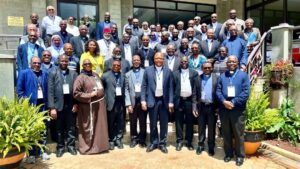ACWECA: Issues of Concern for Consecrated Women in Eastern and Central Africa in Need of “Holistic Transformation”

Sr. Bibiana Ngundo, LSOSF
Sr. Jecinter Antoinette Okoth, FSSA
During the ongoing 18th Plenary Assembly for the Association of Consecrated Women in Eastern and Central Africa (ACWECA) whose theme focuses on re-awakening of the prophetic role of Sisters in the region, the Catholic nuns have shared areas of concern for the realization of “holistic transformation.”
Speaking at the virtual session coordinated from Nairobi, Kenya, on “holistic transformation in Religious life today,” Sr. Bibiana Ngundo a member of the Little Sisters of St. Francis (LSOSF) highlighted that “ As we are called to show Christ to the world through the various ministries of our institutes. People come to experience our presence in the world: at the school, the hospital, catechism class, in the office, in the kitchen, in the farm and through other many ways by which our charisms and missions are expressed.”
Based on these ministries, she said, “There is no way we can think of transformation of Religious life today without focusing on what makes us not proclaim Christ to the people as we should.”
According to Sr. Ngundo, Consecrated women are called to faithfully fulfill the key components of Religious life that give it the shape, that is the evangelical counsels, prayer, apostolate and community living.
In her address to nearly 178 online participants on Tuesday, August 24, Sr. Ngundo a lecturer in African Culture and Religion at the Catholic University of Eastern Africa (CUEA) emphasized that “Consecrated life which is deeply rooted in the example and teaching of Jesus Christ is a gift of God the Father to his Church through the Holy Spirit and is always faced with both opportunities and challenges.”
She noted that consecrated life is “lived in a world that is slowly progressing from peace to chaos, love to hatred, honest to dishonest, truthfulness to lie, from disease to disease, poverty to riches, riches to poverty, and from faith to faithlessness among others.”
The member of LSOSF congregation highlights economic sustainability as an area of concern that Religious Institutes need to look into towards holistic reformation in the ACWECA region.
“Many African congregations are struggling financially, more so during these Covid-19 times in paying high hospital bills. With the growing numbers of sisters in some of our institutes, the challenge of inadequate resources to sustain the sisters in their basic needs, medication and care of elderly sisters among other needs is truly biting,” Sr. Ngundo disclosed adding that most of the issues facing congregations in relation to economic stability “is the lack of financial policies.”
Sr. Ngundo encouraged the women Religious congregations to train Sisters on strategic planning, finance skills and policies so as to prevent poor budgeting and accountability in congregations for the them to acquire skills that would help “foster collective responsibility for the common good which lies at the heart of Religious community life.”
She added, “There is great need for Religious congregations to find ways of collaborating in order to meet these common economic needs and particularly to break away from dependence on resources from overseas donors or salaries only.”
Talking about generational gap as another area of concern for the Consecrated women, Sr. Ngundo noted that age difference between members of a Religious institute becomes quite evident when the congregation keeps growing.
“In this way, at times younger members of a congregation feel misunderstood by older members and vice versa. If not arrested on time, this can lead to division among members, unnecessary and unhealthy class groupings which deter growth of the congregation,” she disclosed.
Sr. Ngundo during her sharing on Tuesday also raised concern regarding “materialism” which is cropping in Religious congregations.
“In an effort to imitate the poor Christ, there is always the temptation to sway our souls to the way of the world… Simplicity is expected of the Religious; detachment; and moderation in everything,” the facilitator said .
She continued, “As Religious, an effort to pull away from the desire for material possession enables us to create room for Christ within ourselves as individuals and as a congregation. By so doing we are more able to attract people to Christ.”
She further condemned individualism as a vice that hinders the Religious’ growth saying, “Among Africans, communal living has been the mode of living but in recent past this is no longer the case. What happens in the larger society influences Religious life too since we do not live in isolation. It is emerging today in Africa, cases of Religious men and women who prefer to stay alone in an apartment or hotel environment. Other emerging manifestations of individualism are disregard for the practice of community prayer, common recreation and having shared meals.”
Talking about the modern means of social communication as a concern, Sr. Ngundo noted that the impact of the information technologies is “a blessing as well as a curse to Religious life, and that addiction to use of mobile phones and access to the internet can have grave impact on personal commitment to Religious life, community living and ministry through distraction and poor time management.”
In conclusion, Sr. Ngundo encouraged the Consecrated women in their call to serve the people of God, reminding them that “Religious life encompasses an attitude of believing in God, adhering to a set of rules and regulations, intimacy with the Divine and submission to God and to the Church.”


